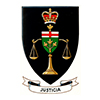Jurisdiction and Powers of the Executive of the Court
Chief Justice
The Ontario Superior Court of Justice is led by the Chief Justice, who oversees its governance and administration. The Chief Justice has numerous responsibilities relating to the governance and administration of the Court. These include statutory responsibilities under various federal and provincial laws. For example, under the Courts of Justice Act, the Chief Justice has the authority to direct and supervise the sittings of the Superior Court and the assignment of judicial duties. Some of the statutory powers and duties of the Chief Justice, as set out in the Courts of Justice Act, include:
- determining the sittings of the court;
- assigning judges to the sittings;
- assigning cases and other judicial duties to individual judges;
- determining the sitting schedules and locations of sittings for individual judges;
- determining the total annual, monthly and weekly workload of individual judges; and
- preparing trial lists and assigning courtrooms, to the extent necessary to control the determination of who is assigned to hear particular cases.
The Courts of Justice Act permits the Chief Justice to delegate this authority to eight Regional Senior Judges so they may exercise this power in their respective regions. The Chief Justice must also assign every Superior Court judge to a region and may reassign a judge from one region to another.
Some of the Chief Justice’s other statutory powers include appointing various officials and representatives such as: registrars in bankruptcy, members of committees including the Rules Committees and the Family Court community liaison, and ad hoc appointments to the Court of Appeal. The Chief Justice is also responsible for reporting and approving judicial leaves of absence and responding to complaints and disciplinary issues for associate justices.
In addition to specific statutory obligations, the Chief Justice has significant duties under the common law, including an overarching responsibility to protect the Court’s institutional independence. As legal scholar, Peter Hogg has written:
“It is the Chief Justice of each superior court who manages the relationship between the court and the government… The Chief Justice has a unique responsibility… for safeguarding the independence of the judiciary.”
This responsibility requires the Chief Justice to communicate and liaise with the federal and provincial governments and many other stakeholders in the justice system, including other courts and the Bar.
Associate Chief Justice
The Associate Chief Justice performs and exercises the duties and powers of the Chief Justice when they are unable to act.
Along with these statutory responsibilities, the Associate Chief Justice performs specific duties assigned by the Chief Justice, including working with the Administrative Judge of the Divisional Court to ensure the effective administration of this branch of the Court. The Associate Chief Justice is also Chair of the Deputy Judges Council and plays a leadership role with respect to Small Claims Court matters on behalf of the Court.
Senior Family Judge
The Courts of Justice Act sets out the duties of the Senior Judge of the Family Court. The Senior Family Judge provides advice to the Chief Justice on specific matters concerning the Family Court, including judicial education, practice and procedure, and Family Court expansion. The Senior Family Judge also performs other duties relating to the Family Court, as assigned by the Chief Justice, and also advises the Chief Justice on family law matters at all Superior Court sites.
Regional Senior Judge
Each of the Court’s regions is headed by a Regional Senior Judge who, further to s. 14(2) of the Courts of Justice Act, and subject to the authority of the Chief Justice, exercises the powers and performs the duties of the Chief Justice in their region. This allows each Regional Senior Judge to manage the judicial sittings and assignment of cases in their region.
A Regional Senior Judge, in turn, may delegate specified functions to another Superior Court judge in the region. For example, Regional Senior Judges may designate Local Administrative Judges to assign and schedule cases at certain court sites or for particular jurisdictions. In addition, Regional Senior Judges appoint deputy judges of the Small Claims Court in their regions (with the approval of the Attorney General), and also address complaints concerning deputy judges.
